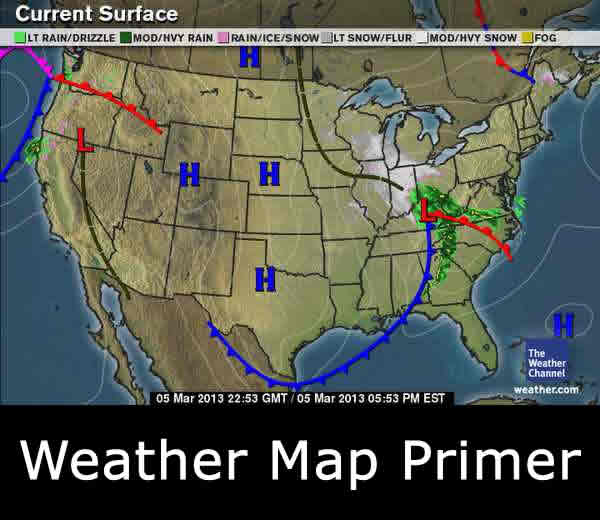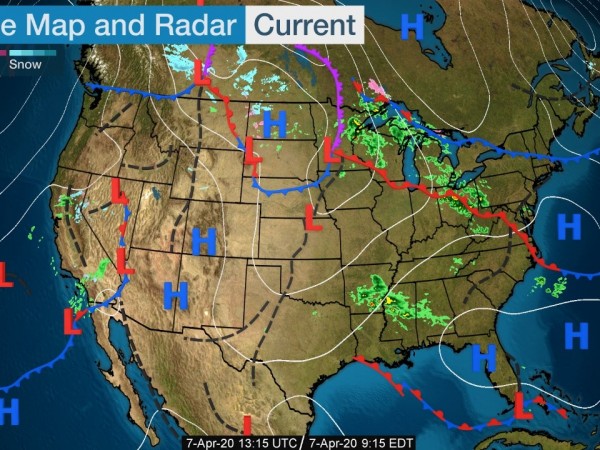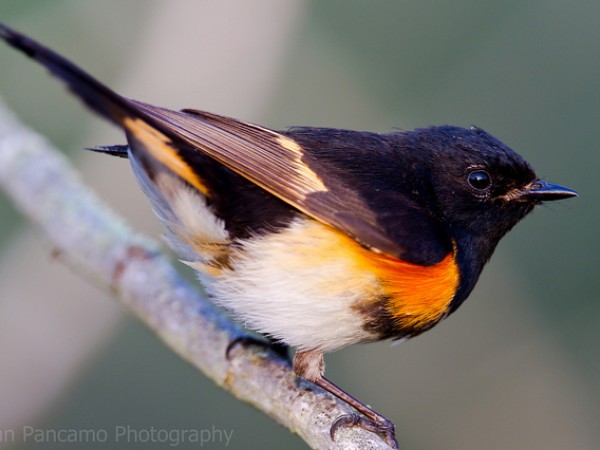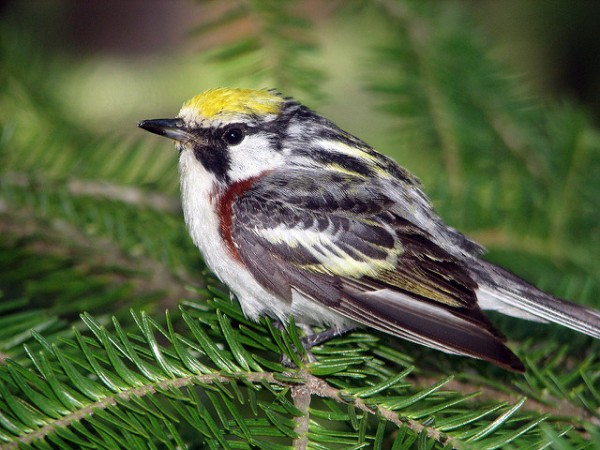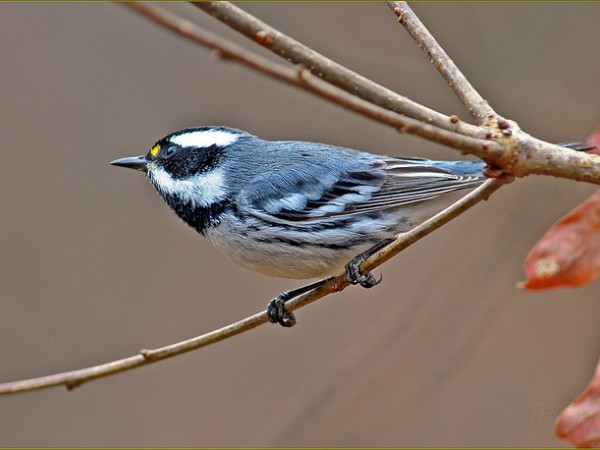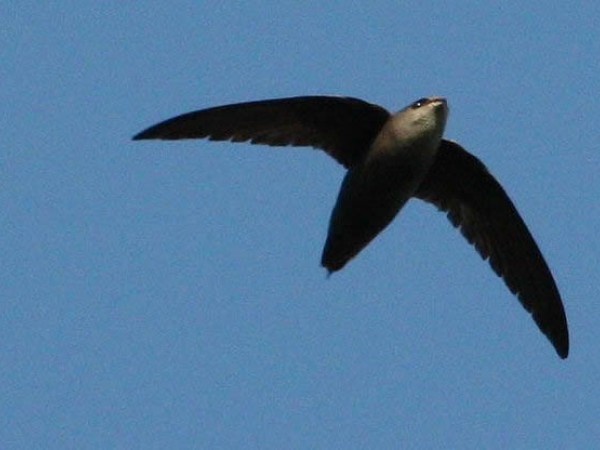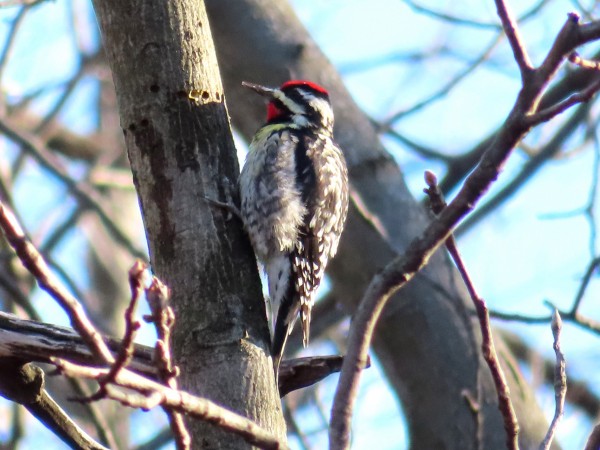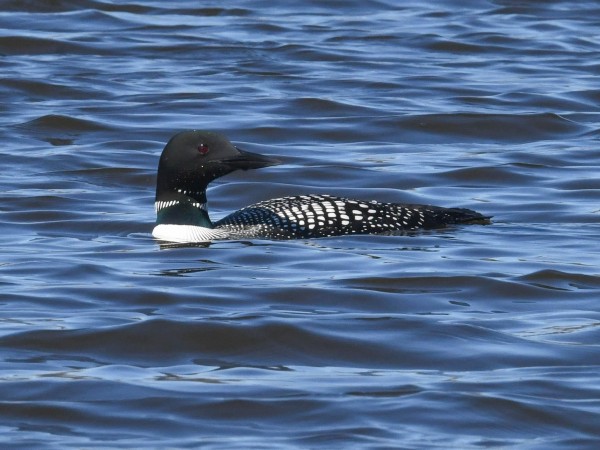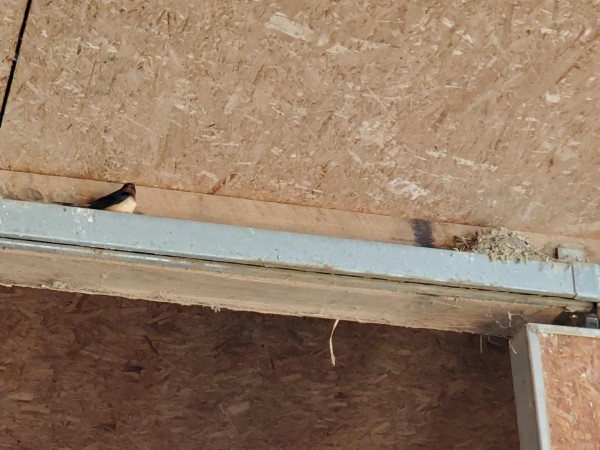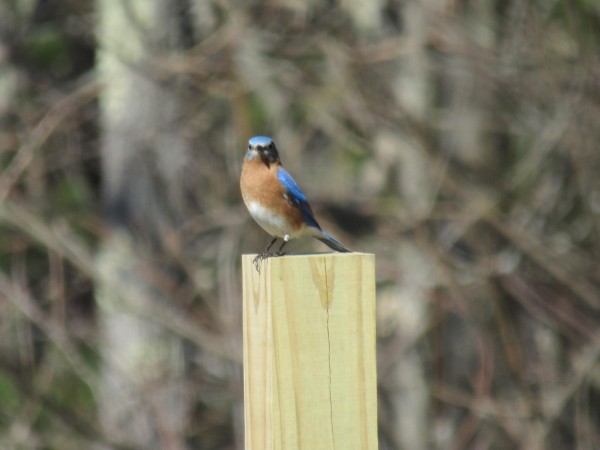Warbler Sightings Picking Up
Dear Journey North Readers,
Spring migration rolls on! Last week I mentioned that a strong cold front might bring the first fallout of the season…and it did! It was not as large or widespread as I was thinking, but that may be because not as many people were out birding. Nonetheless, there were reports of good numbers of birds among the Gulf states. In Alabama, birders recorded 4 species of vireos and 12 species of warblers, including the first American Redstarts, Blackburnian Warblers, Chestnut-sided Warblers, and the first Eastern Wood-Pewee. After a couple of days, the winds shifted to the south, allowing birds to resume their migration. Here in Tennessee, Black-throated-green Warblers and Northern Parulas are abundant. In my neighborhood, I heard my first Red-eyed Vireo, Yellow-throated Vireo, and House Wren. Northern Parulas, Louisiana Waterthrushes, and Yellow-throated Warblers have been abundant in Maryland, West Virginia, Ohio, and Missouri. The first Chimney Swifts arrived in Pennsylvania.
Out west, there have been clear skies and southerly winds for much of the week, and birds have been taking advantage of it. Western Kingbirds have been moving through Arizona, California, and Oregon in large flocks, in some cases numbering in the hundreds! Black-throated-gray Warblers, Hammond’s Flycatchers, and Cassin’s Vireos were new sightings in California. Vaux’s Swifts arrived in Oregon. Tree Swallows are now in Colorado.
So does the coming week look to be as active? Let’s look at the weather map and see. There is a warm front moving through the Ohio Valley and heading toward New England bringing rain to those areas. Birds will be grounded for a day or two. There is also a wave of moisture bringing a pulse of rain to Arkansas, Mississippi, and Alabama. All the birds from the fallout will not be going anywhere during this rainy wave. In contrast, the Rocky Mountain states have clear skies and southerly winds. Look for a lot of migration taking place in that region. Over the next couple of days, a cold front is arriving down from Canada bringing rain and strong north winds to much of the eastern US. This front will keep birds grounded until the weekend. Over the weekend, these birds will only have a day or two to make any migration progress because a second cold front is coming in off of the Pacific Ocean promising heavy rains by Sunday and Monday.
We are still a couple of weeks away from the peak of spring migration, so keep yours eyes open! Take care.
David Aborn
Chuck Henrikson's Birding Report From UW-Madison Arboretum
"Nature awakens with migrating birds and emerging plants with colorful flowers bringing much joy." Read Chuck's birding report from the Arboretum.
Where Are Baltimore and Bullock’s Orioles, Barn Swallows, American Loons and Red-winged Blackbirds Appearing?
Our Journey North citizen scientists have recorded sightings for Baltimore Orioles as far north as St. Paul, MN. A cluster of Bullock's Orioles have been seen around Los Angeles, CA.
From Saint Paul, MN: Yale submitted this comment: "Male [Baltimore Oriole] flew past me while on my deck. 2-3 weeks earlier than I've seen. Putting out oranges and grape jelly." (03/30/2020)
From Frederick, MD: Ellen observed, “one male [Baltimore Oriole] spotted this morning. Ignoring the orange Oriole feeder with nectar, orange half and grape jelly, preferring to eat seeds on the ground under other feeders.” (04/05/2020)
From Frazier Park, CA: Mia shared, “A beautiful male [Bullock's Oriole] showed up today! My Birthday! Same thing happened last year. Lone male hangs around for about two weeks before anyone else shows up. I put out my feeder right away. Saw that he had discovered it the next day. On 6-6-2020 he has been hanging around all day into late evening. 6 inches of snow on the ground this morning. 26* tonight!” (04/02/2020)
It has been a great week for Common Loon sightings in the Great Lakes Region of US and Canada.
From Pardeeville, WI: Karen saw, “At least 38 Common Loons with about three times as many Red-breasted Mergansers. Photo by Mike Reese.” (04/04/2020)
There were Barn Swallow sightings across the US -- from Olympia, WA to Derby Line, VT and many points in between. Journey North citizen scientists have also seen Bluebirds.
From Toronto, ON: Don Davis submitted this report from birdwatcher, Don Graham who "spotted first Barn Swallow of the year at the tip of the Leslie Street Spit (also known as Tommy Thompson Park) - an Important Bird Area." (03/30/2020)
From Dutton, VA: Holley said there is a, “Horse farm with several nests that barn swallows return to every year.” (04/03/2020)
From Acton, ME: Tere shared, “The bluebirds are checking out the nesting boxes.” (04/06/2020)
Looking For Fun Activities To Do At Home?
Look no further! Journey North has many resources for anyone with a curious mind. This week we feature Not-So-Looney Facts about the Common Loon. Let's explore together.
Keep Reporting
Go to the Journey North sightings page and under the 'Select Species or Event' dropdown menu, select 'Oriole', 'Barn Swallow', 'Loon', or 'Red-Winged Blackbird'. If you are seeing other songbirds or species not listed, select 'All Other Signs of Spring' under the dropdown menu.



